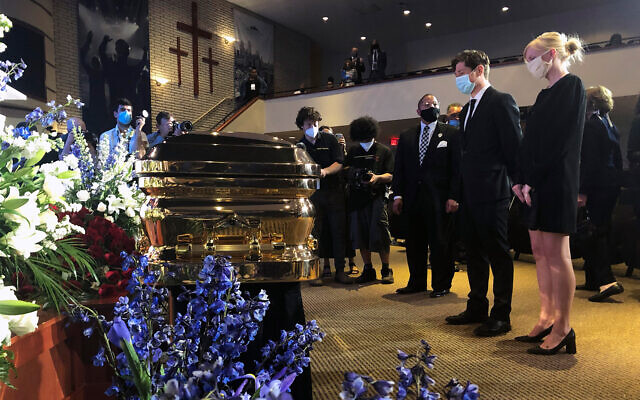Family, celebrities, leading politicians eulogize George Floyd at Minneapolis event, call for changes to policing and criminal justice system

MINNEAPOLIS (AP) — A mural honoring George Floyd was projected above his golden coffin, where mourners knelt and cried, paused and prayed Thursday at his memorial service. Its simple message: “I can breathe now.”
But for far too many black Americans, dreams have been dashed and goals not achieved because they still cannot breathe, said the Rev. Al Sharpton, who eulogized Floyd in Minneapolis on Thursday.
“The reason we could never be who we wanted and dreamed to be is you kept your knee on our neck,” Sharpton said in reference to Floyd’s May 25 arrest, during which a white Minneapolis police officer pressed his knee into the handcuffed black man’s neck for several minutes even after Floyd stopped moving and pleading for air.
“What happened to Floyd happens every day in this county,” Sharpton said. “It’s time for us to stand up in George’s name and say, ‘Get your knee off our neck!”
Floyd’s memorial service was a send-off that his family felt he deserved — they paid heartfelt tribute to a man they affectionately called “Perry.” With many of Minnesota’s top elected leaders in the room, along with members of Congress, the service included strong calls for meaningful changes in policing and the criminal justice system.

During eulogy remarks, Sharpton revealed plans to hold a commemorative march on Washington in August as part of a push for federal policing reforms.
“When we fight for the George Floyds of the world — and more importantly, the unknown George Floyds of the world — we are helping America be America for all Americans,” said Floyd family attorney Benjamin Crump, who listed off the names of other African American men and women killed by police.
Rep. Sheila Jackson-Lee, who represents Floyd’s native Houston and attended the service, said that she and other lawmakers on Thursday introduced police accountability legislation named after Floyd. The measure calls for improved training for police departments and standards for how the use of deadly force and misconduct are investigated, among other aims.
“We have put a stop sign in front of America — there will be no more” unchecked killing by police, Jackson-Lee told The Associated Press. “I will never forget the words ‘I can’t breathe.’ America cannot allow people to die in the 21st century.”
She was among dozens of other politicians, celebrities, civil rights activists and family members of Floyd who sang “Amazing Grace,” prayed and joined together in a rousing memorial that was a celebration for a man whose death at the hands of police has sparked protests nationwide and calls for an end to racial injustice.

Inside the service, held in the Frank J. Lindquist sanctuary at North Central University, mourners wore masks, some with the words “I can’t breathe” on them. Organizers issued several reminders for attendees to keep some social distance. Many attendees bumped elbows rather than hug or shake hands, at the memorial taking place in the midst of the coronavirus pandemic.
It was not the coronavirus that killed Floyd, Crump said his service remarks, but the “pandemic of racism and discrimination.”
Floyd’s brother and other family members told personal stories about dancing, playing football, cooking and enjoying life together. They said he was also known by the other endearing nicknames such as “Georgie Porgie.”
“George, he was like a general,” brother Philonise Floyd said. “Every day he would walk outside there would be a line of people wanting to greet him… He was powerful, man. He had a way with words… Everybody loved George.”
Projected above the pulpit inside the sanctuary was the blue and orange mural that was painted at the site of a makeshift memorial in the neighborhood where Floyd pleaded for air. A small band and choir sang “Goin’ Up Yonder” and other classic gospel songs as mourners gathered. Grammy Award-winning gospel singer Bishop Hezekiah Walker closed the service with the song “Every Praise.”

Others in attendance included Martin Luther King III, Minnesota Sen. Amy Klobuchar; Reps. Ilhan Omar, Ayana Pressley and Joyce Beatty; rappers T.I., with his wife Tiny, Ludacris, and Tyrese Gibson; comedians Kevin Hart and Tiffany Haddish; and actress Marsai Martin.
Floyd’s body will go from the first service to Raeford, North Carolina, the state where he was born 46 years ago, for a two-hour public viewing and private service for the family on Saturday.
Finally, a public viewing will be held Monday in Houston, where he was raised and lived most of his life. A 500-person service on Tuesday will take place at The Fountain of Praise church and will include addresses from Sharpton, Crump, and the Rev. Remus E. Wright, the family pastor. Former Vice President Joe Biden, the presumptive Democratic presidential nominee, may attend, and other political figures and celebrities are expected as well. A private burial will follow.
Floyd’s final journey was designed with intention, Sharpton said ahead of Thursday’s service. Having left Houston for Minneapolis in 2014 in search of a job and a new life, Floyd will retrace that path.
Many mourners have noted that, among the wrenching cries that Floyd made in his final moments, one was for his mother, Larcenia Floyd. His mother had died two years prior.
Sharpton said George Floyd was calling for his mother because, as he neared death, she had her hands outstretched to him calling him back home.
“Come on, George,” Sharpton said. “I’ll welcome you where the wicked will cease from troubling you, where the weary will get rest. It’s a place where police don’t put knees on you, George.”
As reported by The Times of Israel
